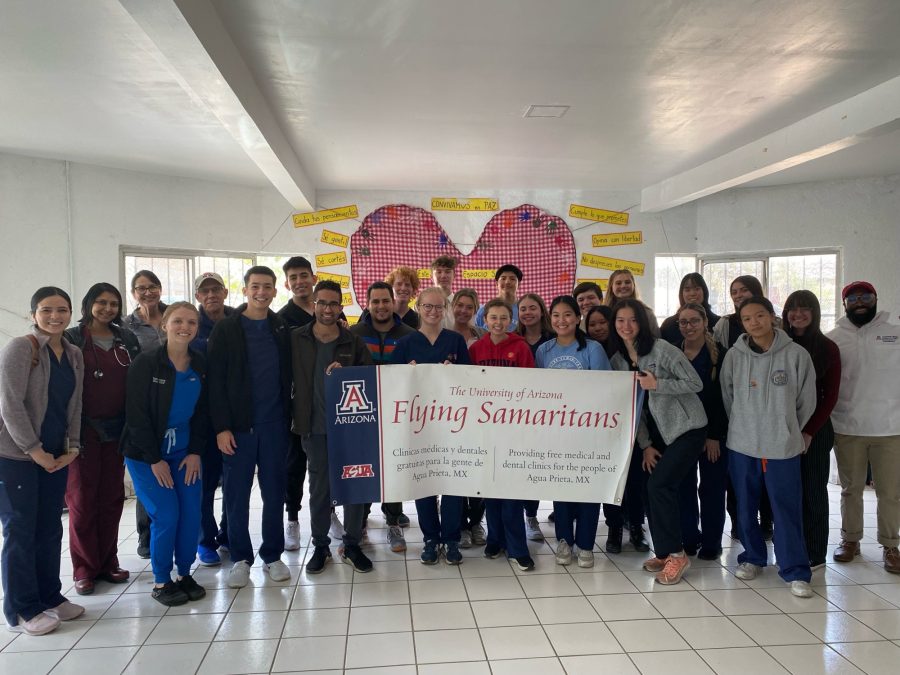Out of hundreds of clubs and organizations at the University of Arizona, Flying Samaritans really is one-of-a-kind. This pre-health club not only allows students to put their education into practice but to also travel out of the country and use their linguistic and medical skills to make a real impact.
Flying Samaritans has several branches, mainly in Arizona and California, that are dedicated to providing free healthcare to communities in Mexico. Originally, members of these chapters would fly to communities in small propeller planes, giving the organization its name. The UA’s Flying Samaritans chapter travels by car, but they are still dedicated to the organization’s mission, hosting medical clinics in Agua Prieta, Sonora, Mexico.
Alexandra Jaeger is one of the people who has made this effort possible over the past several years. As a senior neuroscience major, she is in her third year as co-president of the club. In this role, she helps to lead meetings and prepare members for their monthly medical clinics in Agua Prieta, which is about a two-hour drive from Tucson.
Jaeger explained that the club meetings involve training, activities and panels to educate members on relevant health topics. The club also consists of several committees that students can join, including translation and interpretation, pharmacy, public health, scribing and outreach. She especially emphasized the value of cross-cultural communication and exchange in their work.
Once a month, several members of the club drive to Agua Prieta, where they spend the majority of the day holding a clinic. Around 30 students attended their clinic in February. The students are accompanied by several healthcare providers, physicians or nurse practitioners that volunteer with the organization. One of the roles of Flying Samaritans’ leadership team is to find these providers and assist them.
“Our clinics wouldn’t be able to happen without generous time commitments made by a lot of these volunteers,” Jaeger said.
The clinics include triage, public health outreach, dental care and a pharmacy. The club’s funding pays for all prescriptions.
“A lot of the patients also depend on our clinics to be able to get refills of their medication,” Jaeger said.
Students are able to assist providers with check-in, taking vitals, language interpretation and more. Jaeger emphasized that Agua Prieta is a medically underserved community and Flying Samaritans’ clinics provide vital services for the people that live there.
For students who have participated, Flying Samaritans provides invaluable experience. Rue Arce graduated from the UA last May and served as a co-head of translation and interpretation for two years.
Arce mentioned that many pre-health clubs had a “competitive aspect,” but she enjoyed the friendly atmosphere of Flying Samaritans. As a physiology and Spanish double major, the club perfectly combined her interests.
“This club really helped me find a community among pre-meds that were like-minded,” Arce said.
Arce now works as a population health technician at El Rio Health Center. Part of her job includes outreach about issues like diabetes in both English and Spanish and she is often reminded of her time in Flying Samaritans and the lessons she learned in the club.
Now as an alum, Arce has attended a few clinics and is eager to see the club’s new members grow and provide advice to them about medical school.
Of course, these clinics involve hard work not only from UA students but also from their partners in Agua Prieta.
Joca Gallegos is a coordinator with Frontera de Cristo, a border ministry located in Agua Prieta and Douglas, Arizona. She has helped make medical clinics possible in Agua Prieta since 2010.
In an email that was translated from Spanish, Gallegos explained how the partnership between FDC and the UA began in 2008.
“FDC would be in charge of organizing and promoting the clinics in the communities, keeping the spaces ready and being the link between the patients and the clinics,” she said.
Gallegos also spoke about the importance of these clinics, since health care can be very difficult to access for many in this region.
“Medical service is expensive in the community and when you have social security, the appointments are often far away and not everyone has this service,” Gallegos said.
In Agua Prieta, she added, these clinics provide “the opportunity to get a second opinion” and “free service for vulnerable communities.”
Jaeger said that the club is always looking for new members, including those from outside of pre-health majors. In order to continue with the club’s mission after current leaders graduate, they need to keep training new members.
“The goal for the club is to be able to still serve as many patients as we can as well and efficiently as we’re able to,” Jaeger said.
Follow Erika Howlett on Twitter









